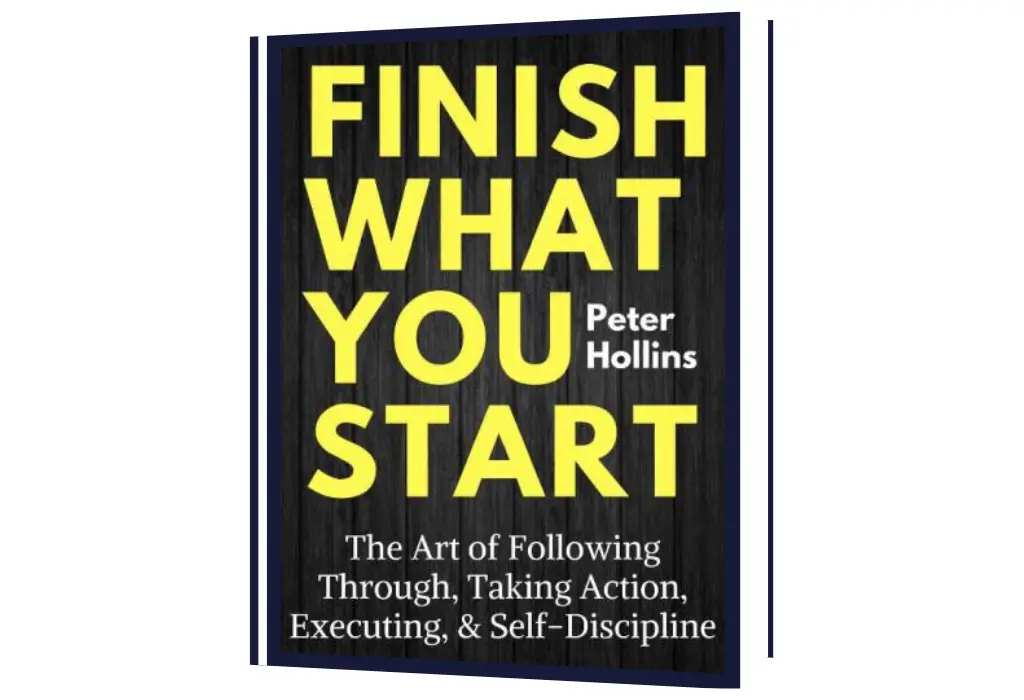Practical tactics to grow your willpower, stop procrastination, focus like a laser, and achieve whatever you set your mind to. Following through and finishing what you start- more valuable skills than you realize. They are a combination of traits that enables you to create the life you want – without having to compromise or wait. The alternative is a status quo that you’re stuck in. Is your life a series of unfinished tasks and intentions? That stops now. Finish What You Start is a unique deep dive into the psychology and science of accomplishment, productivity, and getting things done. It takes a thorough look why we are sometimes stuck, and gives detailed, step by step solutions you can start using today. Every phase of finishing and following through is covered, and even productivity pros will be able to learn something new. Above all else, this is a guide to understanding your brain and instincts better for optimal results. Channel massive productivity and mental toughness. Peter Hollins has studied psychology and peak human performance for over a dozen years and is a bestselling author. He has worked with dozens of individuals to unlock their potential and path towards success.
In Finish What You Start, Peter Hollins explores the essential principles of discipline, perseverance, and follow-through, focusing on how to overcome procrastination and achieve your goals by taking consistent action. Hollins provides practical strategies for overcoming distractions, defeating mental roadblocks, and developing the habits and mindset necessary to finish projects and achieve personal or professional success.
Introduction: Why We Struggle to Finish
Hollins begins by discussing why so many people struggle to complete what they start. He identifies common obstacles like procrastination, perfectionism, and fear of failure, all of which lead to projects being abandoned midway. Modern life, with its myriad distractions, makes it difficult to focus on long-term goals. Our brains are wired to seek short-term pleasure, leading us to get sidetracked by easier, more enjoyable activities rather than finishing the challenging tasks we’ve set for ourselves. This leads to a vicious cycle of frustration, where half-finished tasks accumulate, and our confidence wanes.
The main message is that people fail to complete tasks not due to lack of talent or ability but because they don’t have the right systems or mental frameworks in place. To break this cycle, we must build habits and cultivate a mindset that encourages finishing and consistency.
Chapter 1: The Science Behind Stopping and Starting
In the first chapter, Hollins dives into the psychology behind why people tend to start but not finish tasks. He explains how dopamine, the brain chemical responsible for motivation, drives us to start new things, but it quickly fades once the novelty wears off. This is why many projects are abandoned after the initial excitement wanes.
Hollins discusses the Zeigarnik effect, a psychological phenomenon where unfinished tasks linger in the mind, causing mental stress. This explains why unfinished projects haunt us and drain our mental energy. However, by creating small steps and consistent habits, we can harness the Zeigarnik effect to push us toward completion rather than procrastination.
Chapter 2: The Power of Decision-Making and Commitment
Hollins stresses the importance of decision-making in finishing what you start. Indecisiveness leads to half-hearted efforts, and without true commitment, projects will always remain incomplete. When you commit to a task, you close the door to other options, making it easier to focus and follow through.
The key here is to set clear goals and make concrete decisions about what you want to accomplish. You need to know your “why” and have a deep connection with the end result to sustain your efforts when motivation fades. Hollins suggests adopting a “no escape route” mindset, where you remove distractions and alternatives that might pull you away from your goal. This way, you’re more likely to push through obstacles.
Chapter 3: Taking Action with Minimal Motivation
Motivation is unreliable—it comes and goes. Hollins emphasizes that successful people don’t rely on motivation to finish tasks; instead, they rely on discipline and habits. He explores the two-minute rule, a productivity hack that suggests if a task takes less than two minutes, you should do it immediately. This simple trick helps build momentum, making larger tasks seem less daunting.
Hollins also introduces the concept of activation energy—the initial push required to start a task. The more you lower this activation energy, the easier it becomes to take action. For example, if you want to exercise, having your gym clothes ready the night before reduces the mental resistance to working out. The goal is to create an environment that encourages action rather than waiting for the perfect moment of inspiration.
Chapter 4: Building Habits That Stick
Habits are crucial to finishing what you start. According to Hollins, successful people rely on structured routines and daily habits to achieve their goals, rather than waiting for bursts of motivation. He emphasizes that habits reduce the need for decision-making, which depletes mental energy over time.
Hollins offers practical advice on building habits:
- Start small: Break down larger goals into tiny, manageable tasks. This reduces overwhelm and builds confidence as you achieve small wins.
- Consistency over intensity: Rather than doing something sporadically in large bursts, focus on doing it daily, even if it’s for a short time. This builds momentum.
- Create triggers: Associate your desired habit with an existing behavior or a specific time of day. For example, if you want to meditate, always do it after brushing your teeth in the morning. This links the new habit with an established routine, making it easier to remember and follow through.
- Track your progress: Measuring your progress keeps you accountable and helps reinforce the habit. Use a journal or app to track each time you complete your habit.
Chapter 5: Overcoming Obstacles and Mental Blocks
Inevitably, obstacles arise, and Hollins delves into strategies for overcoming them. One of the biggest barriers to finishing tasks is fear—fear of failure, criticism, or even success. Hollins encourages readers to shift their mindset from a fear of failure to a growth mindset. Instead of viewing mistakes as personal shortcomings, see them as opportunities for learning and improvement.
Hollins also stresses the importance of self-awareness. Understanding your tendencies, such as procrastination or perfectionism, helps you confront these behaviors head-on. Perfectionism, in particular, is a major roadblock, as it creates unrealistic expectations that lead to avoidance. The solution is to embrace imperfection and adopt a “good enough” attitude. Progress matters more than perfection.
Chapter 6: Productivity Strategies to Stay on Track
Hollins offers several productivity strategies designed to help readers stay focused and productive over the long term. One such technique is time blocking, which involves scheduling specific periods for focused work on one task. By dedicating uninterrupted time to a single project, you can make significant progress without the distractions of multitasking.
Another method is the Pomodoro Technique, where you work for 25-minute intervals followed by short breaks. This technique prevents burnout and makes daunting tasks feel more manageable. It also leverages the psychological benefit of working against the clock, which can boost focus.
Hollins also advocates for the 1% rule, where you aim to improve by just 1% each day. This gradual improvement compounds over time and leads to remarkable progress.
Chapter 7: The Role of Environment in Success
Your environment plays a critical role in your ability to finish tasks. Hollins explains how clutter, distractions, and noise can derail focus and productivity. He advises creating a distraction-free workspace where you can concentrate on the task at hand.
Additionally, Hollins emphasizes the importance of surrounding yourself with people who support your goals. Negative influences or unsupportive individuals can sap your energy and motivation, so it’s crucial to build a positive social network that encourages and holds you accountable.
Chapter 8: Handling Long-Term Projects
Many people struggle to complete long-term projects because they feel overwhelming. Hollins recommends breaking them down into smaller chunks and setting short-term milestones. Each milestone provides a sense of accomplishment and keeps you motivated as you work toward the final goal.
He also encourages readers to regularly review their progress and adjust their approach as necessary. This keeps you on track and ensures that small setbacks don’t turn into major obstacles.
Chapter 9: Finishing: The Psychological Reward
Hollins concludes the book by discussing the immense psychological satisfaction of finishing a task. Completing projects not only boosts self-esteem but also creates a sense of momentum that makes future projects easier to tackle. The more you finish, the more you build confidence in your ability to follow through.
The key takeaway from this chapter is the importance of celebrating your wins—no matter how small. Taking time to acknowledge your achievements reinforces positive behavior and makes it easier to finish future tasks.
Conclusion: Becoming a Finisher
Finish What You Start is a practical guide for anyone who struggles with follow-through. By understanding the psychology of motivation, building productive habits, and learning how to overcome obstacles, you can develop the skills necessary to finish tasks consistently. Hollins emphasizes that the ability to finish is not an inherent trait but a skill that can be learned and refined over time.
The book provides readers with actionable steps to break the cycle of procrastination and become a “finisher”—someone who starts projects with intention and follows through until they’re completed. Whether you’re working on personal goals, professional projects, or creative endeavors, the strategies in this book can help you turn unfinished business into completed accomplishments.







